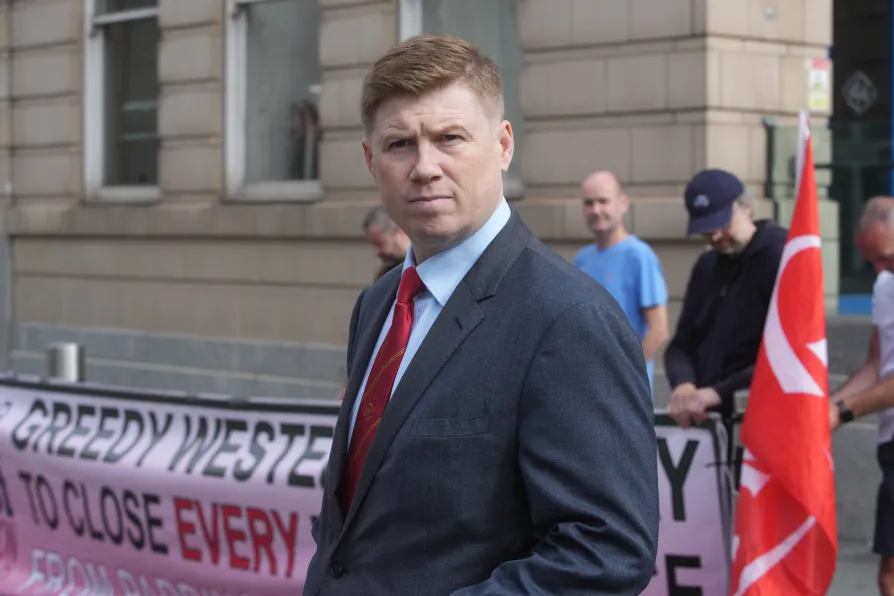The language of humiliation is a step towards a second civil war, argues RAMZY BAROUD
RMT leader Eddie Dempsey's stark warning shook up a fringe meeting at the Scottish TUC

 Eddie Dempsey joins the picket line outside Paddington Station, London, August 26, 2023
Eddie Dempsey joins the picket line outside Paddington Station, London, August 26, 2023
TRADE unions will be an irrelevance within 20 years — “a memory of a movement” — unless they confront the inadequacies in the Employment Rights Bill and secure sectoral collective bargaining and the right to take solidarity strike action, RMT leader Eddie Dempsey warned on Monday night.
The Institute of Employment Rights-Trade Union Co-ordinating Group fringe meeting heard that the Bill leaves serious restrictions on trade union activity and does not deliver the changes hoped for.
“My litmus test is very simple. We could have another P&O” (when the ferry company sacked 800 workers by video link and replaced them with cheaper labour) “under this piece of legislation and it would do nothing to stop it,” Dempsey said.
“If you look at what’s happened in Britain over the last 40 years and across Western economies, we’ve seen the collapse of living standards. Globalisation and neoliberalism have delivered offshoring of our manufacturing and industry, the outsourcing of what’s left.
“Collective bargaining has fallen from covering 80 to 25 per cent of workers. The trade union movement collapsing from 13 million members to six million. Living standards at rock bottom and inequality worse in Britain today than it was in the time of Marie Antoinette and the French Revolution.
“How has this happened to us? Because the politics adopted across Western economies sold our national assets and our wealth. Privatised it. Shipped it abroad in the effort to find cheaper wages and higher profits. And that’s left us with a service economy. We’re a collection of banks with a country attached.
“When Thatcher floated the pound, she removed the manufacturing base, the industrial foundation of our movement. That did more damage than any anti-trade union legislation.
“That has left us with deindustrialised parts of the country. They have not just lost their work and their industry. They’ve lost us. The trade union movement has been ripped out of working-class communities right across Britain.”
The RMT leader said the absence of trade unions in working-class areas was one reason the far right is able to grow.
“The only way to put things back together is through sectoral collective bargaining. You must put the trade union movement back into the community.”
It was also vital to restore the right to solidarity strike action — the ban on secondary action was “acid on the bonds of solidarity that held us together,” Dempsey charged.
“Why should it be the case that there is a law in this country that says if I feel moved to support a nurse, a postie or anyone else I see fighting for their livelihood, I am banned from withdrawing my labour in their support?” With the right to secondary action, P&O could never have happened, he explained: workers would have walked out at ports all over Britain, and even employers would have policed P&O, warning it against an act that would bring the whole sector to a halt.
Unity among all unions in fighting to restore these rights was essential if the movement was not to fade into nothing in the next decades, he concluded.
Professor Ruth Dukes of the IER took the meeting through specific flaws in the legislation. These included a complex framework for access agreements for unions to enter workplaces, with no effective enforcement of the right; a continued requirement to ballot workforces on recognition, encouraging anti-union practices by employers, the continued ban on secondary action and the failure to introduce sectoral collective bargaining except in a limited way for adult social care and school support staff.
The Public & Commercial Services union’s Fran Heathcote pointed out that the government was not even prepared to discuss the introduction of collective bargaining “in its own back yard” — the Civil Service — and said unions had a fight on their hands to secure electronic balloting for industrial action, though she argued that the Bill “does present numerous opportunities to trade union activists to organise within their workplaces, and that is the job we have to do.”
“No piece of legislation will ever substitute for workers’ power,” bakers’ union BFAWU general secretary Sarah Woolley pointed out. She criticised “those in our movement who champion [the Bill] with no reference to the parts that are missing,” including even the basic issue of the single status of worker that would guarantee rights for millions.
Labour has made much of its workers’ rights reforms, presenting them as its main offer to the trade union movement. But the mood at the IER-TUCG fringe meeting was far from optimistic, and said the struggle to unshackle Britain’s unions was only just beginning.

Ben Chacko talks to RMT leader EDDIE DEMPSEY about how the key to fixing broken Britain lies in collective sectoral bargaining, restoring unions’ ability to take solidarity strike action and bringing about the much-vaunted ‘wave of insourcing’

It is only trade union power at work that will materially improve the lot of working people as a class but without sector-wide collective bargaining and a right to take sympathetic strike action, we are hamstrung in the fight to tilt back the balance of power, argues ADRIAN WEIR

This May Day we reaffirm our commitment to working people and our class and to get trade unionism back on the front foot, says EDDIE DEMPSEY










